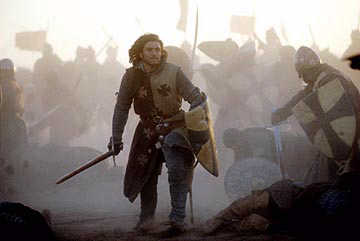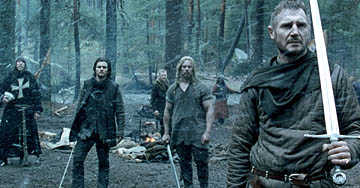

The battle for Jerusalem in the 12th Century serves as a backdrop for Kingdom of Heaven, the latest reentry in the large epic blockbuster genre, after disappointments like Alexander and Troy. But helming this version is Ridley Scott (Matchstick Men, Black Hawk Down), who nailed the genre with Gladiator. Here, he infuses character development, topicality, and breathtaking battle scenes and comes up with an enjoyable popcorn flick with more brains than average. It's not as smart as Scott and screenwriter William Monahan wanted it to be, but it is deeper than most films that make it into multiplexes.
One of the largest concerns in films today, especially post 9/11 is the depiction of Muslims. After all, Kingdom of Heaven takes place during the Crusades, where 'righteous' Christians crusaded to free Jerusalem from the 'infidel' Muslims. Scott treads carefully here, ensuring that his portrayal of all characters was balanced. There are good and bad seeds on both sides, and in tying things in to today's political climates, there are hawks on both sides that will do anything to instigate war. King Baldwin (an uncredited Edward Norton, The Italian Job, The 25th Hour), a leper, ruled the city, but declared it an area where all religions could meet and worship. The Saracen forces of Saladin (Ghassan Massoud) surrounded the city, and vastly outnumbered the Christians. Scott portrays Saladin as wise and pragmatic. He will do what he can to win, but also sees the bigger picture. Baldwin maintained an edgy but peaceful relationship with the Saracens, thanks to his advisor Tiberius (Jeremy Irons, Being Julia, The Merchant of Venice). Guy de Lusignan (Martin Csokas, The Bourne Supremacy, The Return of the King) schemes to be King and to instigate a Holy War against Saladin, believing that despite the huge numbers against him, the righteous side (i.e. his side) will win. The Templars, led by Reynald (Brendan Gleeson, In My Country, The Village) are the real bad guys, depicted as vicious hooligans doing what they can to instigate war.
Into this mess steps Balian de Ibelin (Orlando Bloom, Troy, The Return of the King), a blacksmith-cum-knight with the noblest of intentions. This is Bloom's first outing as the lead in a major film, and although he bulked up twenty pounds in muscle, he still does not manage to carry the film. He still looks the part of a teenage idol, but does not have the gravitas necessary to project an aura of authority. This is especially true when placed next to his co-stars - Liam Neeson (Kinsey, Love Actually), Norton, Irons, and Gleeson combined have decades of experience on Bloom, and their performances far outclass his. This is even taking into account the fact that Balian is young and unsure of himself. At the beginning of the film, Godfrey de Ibelin (Neeson) arrives and Balian discovers that he is Godfrey's son. Godfrey asks Balian to accompany him to Jerusalem, and Balian, whose wife committed suicide after the death of their infant son agrees. Godfrey becomes mortally wounded on the way, but not before he knights his son, charging him to do right at all times.
Once in Jerusalem, Balian's progressive outlook and sincere desire to help all win the admiration of Tiberius and Baldwin, and the derision of Lusignan. Lusignan's wife, Sibylla (Eva Green, The Dreamers), who also happens to be Baldwin's sister, also takes a keen interest in Balian. The one plot point that did not work well was the romance between Balian and Sibylla. Balian's character is committed to doing what is right, yet still has an affair with a married woman. Tensions simmer between Christians and Muslims, Tiberius and Lusignan, Sibylla and Balian, and pretty much everybody else until Lusignan manages to provoke war. Kingdom of Heaven shifts into battle mode, which culminates in a huge siege of Jerusalem, teeming with siege towers, arrows, charges, catapults, and thousands of extras, both real and CGI. By this point, the viewer has a pretty good read on how Balian thinks, and now Scott applies his thinking into action. His primary concern is for the safety of the women and children. Politics interest him little (he had the chance to avert war, but this mean going against his principles), and he is willing to fight to the death to stand up for his beliefs, giving a bit of context to the fighting. Scott is great at large-scale battle sequences, and knows how to milk them for all its worth. He pans back for sweeping views, gets up close for violent, visceral shots, and pauses at the right times to let people catch their breath. Best of all, he manages to stay relatively within the bounds of history.